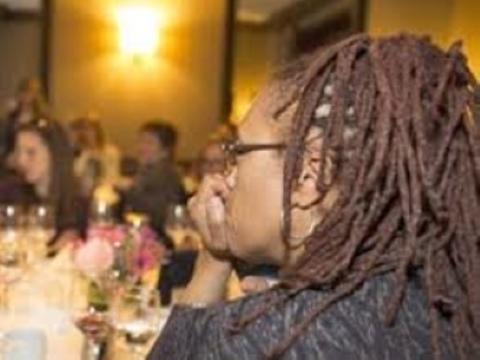Women Leaders Gather at HDS for National Leadership Conference

Judith Casselberry, 2012-13 WSRP research associate, listens to a talk at the 2014 NLC. Photo: Rose Lincoln
"A shot of adrenaline." That's how Amy Post, a practicing interfaith minister in New York, described this year's Women's Studies in Religion Program (WSRP) National Leadership Conference (NLC), held February 7-9, 2014, in Cambridge.
Post joined a group of more than three-dozen women leaders in religion, academia, business, and many other fields, to hear about the program's latest research, as well as innovative work by WSRP Leadership Council members.
"We study how gender is constructed and created, and how womanhood and power go together," said Ann Braude, Senior Lecturer on American Religious History and director of the Women's Studies in Religion Program, in addressing conference attendees.
Based at Harvard Divinity School, WSRP fuses activism and groundbreaking scholarship to inspire, enlighten, and energize women around the world. The program funds associates who conduct new research and then disseminates the knowledge through courses, lectures, and publications in countries around the world. More than 150 scholars have come through WSRP since its launch in 1973, when the program essentially created the field of women's studies in religion.
"(WSRP) caused me to rethink my verbiage and theory...changing my questions based in patriarchy to questions based in matriarchy," said Jacquelyn Williamson, one of the program's current scholars who investigates the ancient world.
At the NLC, Williamson discussed her discovery of a sunshade temple devoted to Queen Nefertiti, (1370 BC–ca. 1330 BC), wife of King Akhenaten. She contended that, when Akhenaten banned worship of all gods except Aten, the visible sun, his wife filled the role of a fertility goddess.
"You (the WSRP Leadership Council) are the midwives of this discovery," Williamson said.
Current projects
2013-14 Research Associates Sarah Bracke, Lihi Ben Shitrit, and Amanda Izzo, along with 2012-13 Research Associates Judith Casselberry and Zilka Spahić Šiljak, also presented their latest work.
Ben Shitrit and Bracke interview women in fundamentalist movements in Israel and Italy—where religious law strictly limits women's roles—who nonetheless find power in their spiritual life. Ben Shitrit said that she found a common thread among Jewish Israeli settlers and Muslim women of Hamas: when there is an external threat to the community, women abandon their traditional roles to protest.
Bracke said that female members of the Comunione e Liberazione—a Catholic movement where many take vows of chastity, obedience, and poverty—view their choices as an act of God.
"The language of 'choice' is inadequate," Bracke said. "...social science language around agency...frames our lives, and frames certain lives [of religious women] as incomprehensible."
Judith Casselberry, a 2012-13 WSRP Research Associate, discussed her work on gender, faith, and power in Black Apostolic Pentecostalism. She told of women altar workers who cannot be ordained as ministers, elders, or deacons, yet spend hours every Sunday demonstrating their sacred power by helping congregants who answer the call to come and demonstrate their faith.
Research Associate Zilka Spahic Šiljak collects the stories of women peacemakers in Bosnia and Herzegovina. At the NLC, she spoke of reaching out to Serbian, Croatian, and Bosnian women who may be Catholic, Eastern Orthodox Christians, Muslim, agnostic, or atheist, but who defended neighbors of all faiths during the civil war of the 1990s.
Amanda Izzo talked about her research on women at the center of conflict: the Maryknoll nuns, whose international commitment to the poor dominated headlines in 1980, when two of their American Sisters were murdered by El Salvador's military commanders.
Broad scope, impact
WSRP's supporters also led discussions during the conference. They spoke of the value of seeing religion through the lens of gender—and of working to change the view.
Barbara Bridges, founder of Women + Film, a nonprofit which celebrates women filmmakers, said that the goal of her work is "to give women a voice." Pat Cooper, founder of the Women's Regional Network (WRN), told how the group had grown into a collaborative of women leaders from civil society organizations in Afghanistan, Pakistan, and India. Today, the WRN hosts meetings that enable women across nations to discuss common concerns including sexual violence, maternal mortality, and women's literacy.
On Saturday, February 8, attendees also heard from conference's featured speaker: author Letty Cottin Pogrebin, a founding editor of Ms. magazine and a WSRP board member. Pogrebin talked about her latest book, How to Be a Friend to a Friend Who's Sick, and led a discussion on how to help non-caregivers cope with friends' illnesses.
Sunday's highlight was a conversation between Michelle Clayman, a member of the HDS Dean's Council, strategic adviser to the WSRP, and founder and chief investment officer of New Amsterdam Partners, LLC, and Geeta Aiyer, MBA '85, chief strategist for investment products at Boston Common Asset Management, about models of sustainable capitalism.
The NLC demonstrated how the field of women's studies in religion has influenced male scholars as well, including HDS Dean David N. Hempton.
Hempton said that the work of J. Michelle Molina—a former WSRP Research Associate and now the John W. Croghan Associate Professor in Catholic Studies at Northwestern University—allowed him to "cut through male sectarian scholarship," and see a larger picture of the 'religion of the heart' that spanned both Protestant and Catholic movements in the eighteenth century.
"I had a conversion experience!" he said.
—by Meg Muckenhoupt